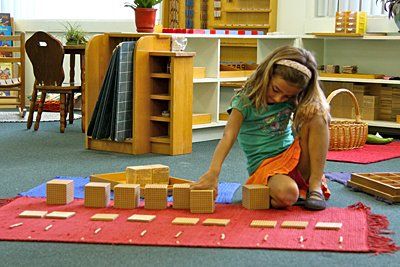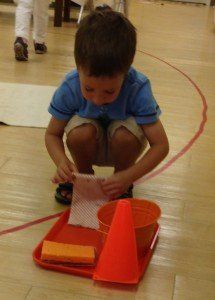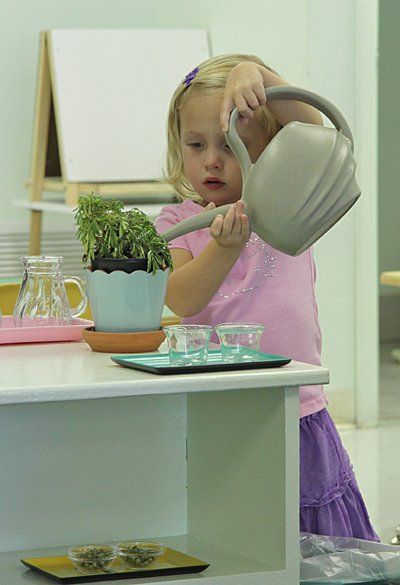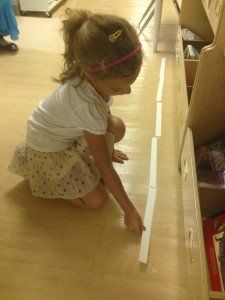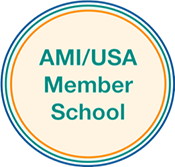Primary
A Love for Learning
3 - 6 years

“… education is a natural process carried out by the human individual, and is acquired not by listening to words, but by experiences in the environment.”
- Dr. Maria Montessori
A person that is truly educated continues learning long after leaving the classroom because he or she is motivated by a natural love of learning and a quest for knowledge.
The goal of early childhood education, therefore, should be to cultivate the child’s own natural instinct to learn. In the Montessori classroom, this goal is achieved by allowing the child to experience the thrill of learning by choice rather than force while at the same time encouraging the child to perfect his or her own skills, so that the child can take full advantage of future learning situations.
Children in the Primary program have what Montessori referred to as the “absorbent mind” – the ability to absorb all aspects of culture and environment without effort or fatigue. To help with this period of “self-construction” – individual work is encouraged.
The areas of Practical Life, Sensorial, Language, and Mathematics make up the central “core” of the Montessori curriculum. Together they support the child’s ability to express and think with clarity as he/she adapts to the world around him/her. Practical Life lessons promote the concepts of Caring for Oneself, Caring for Others and Caring for the Environment. Activities in this area of the classroom include many of the tasks that children see done in their own home environment, like preparing food, washing tables, etc, along with exercises of Grace and Courtesy. Through the self-care exercises the children develop confidence and independence. Control and Co-ordination of their movements is developed, as well as their powers of self-control and concentration. They also learn the habit of working at a task from beginning to end.
“The development of the mind comes through movement.” - Dr. Maria Montessori
The Sensorial Exploration area of the classroom develops the ability of the child to perceive and understand the world through the senses. Children learn to order and classify their environment by touching, feeling, smelling, seeing, listening, tasting and exploring the physical properties of their environment. Dr. Montessori understood and embraced the words of Aristotle, ”There is nothing in the intellect which was not first in the senses…”
The Primary classroom is rich in English and Spanish conversation, stories, and song. Sandpaper letters, recognize the child’s need for a tactile expression of a sound and provide the means for the child to link sound and symbol naturally, encouraging the development of written expression and reading skills. Mathematics activities rely on the use of Dr. Montessori's own beautiful and concrete math materials that the children can manipulate themselves. The children are given a solid understanding of basic and complex mathematical principles, which prepares them for later abstract reasoning and problem-solving. Geography, Biology, Botany, Zoology, Art and Music are presented as extensions of the seasonal and language art activities. Children learn about people and cultures of other countries and come to feel connected to the greater world around them.
Through the lessons in each of these areas, the children learn to perfect their coordination, to increase their independence, to develop their span of concentration, to classify and organize all types of information, and to read and write with a joy that motivates them to constantly improve their skills.
“My two kids just completed their first year at Little Flower Montessori. My husband and I cannot be happier with the way in which our children have thrived and developed during this initial year. The staff is amazing and always willing to go the extra mile for the kids. My children have had a great first year and have learned so much. I did much research on other private schools in the area and am very happy that we decided to send our kids to LFM. Truly an exceptional school”
- Submitted by a parent
Primary Enrollment Policy
The Montessori method is based on the premise of the multi-year cycle. This cycle begins when a child enters the Primary classroom at three years of age and is completed when a child finishes his/her kindergarten year. Depending on a child’s birthday and particular needs, this cycle, can last three or four years.
During these years, each student is moving through the Montessori curriculum; simultaneously developing the social, physical and emotional skills, as well as the self-discipline, that go hand-in-hand with the academics in a Montessori classroom. So much of what a Montessori child is exposed to (through observing the older students) is unattainable to them until the age of five or six; it is part of what motivates the younger child to challenge him or herself so that they will someday be able to do the work of the older child. Therefore, the final year of the primary cycle, the kindergarten year, is the most important.
This is the period during which everything comes together for the child: it is the culmination of two or three years of developing into kind, resourceful, self-directed students who then lead the class and set an example for the younger students.

